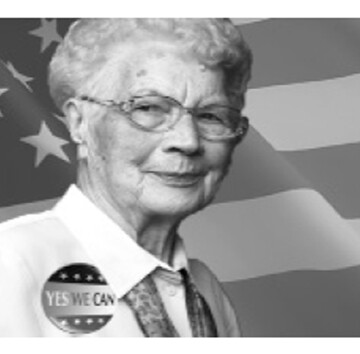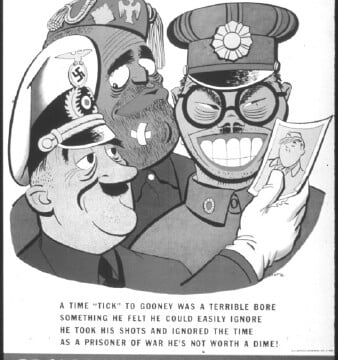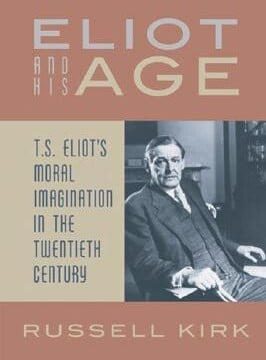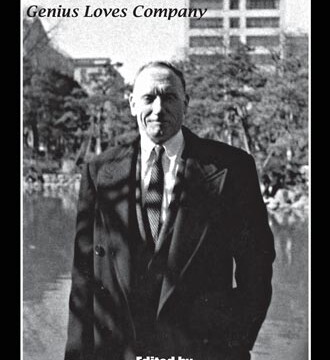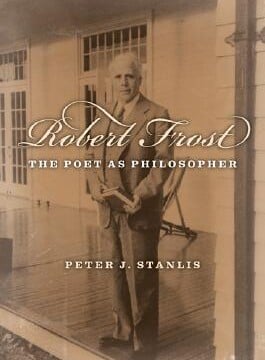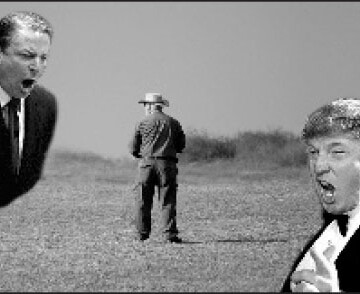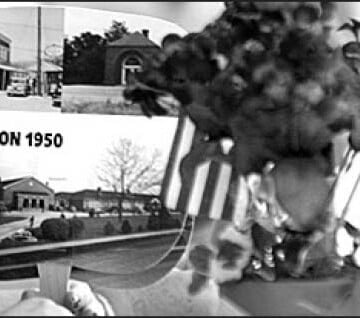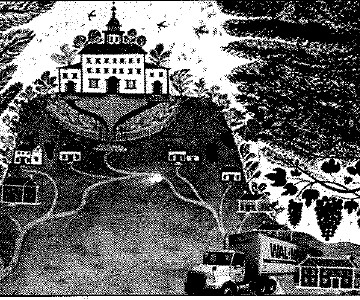Andrew Lytle’s “The Hind Tit” is the best essay in I’ll Take My Stand (1930), not only because it focuses on the small, independent farmer, the class the Agrarians most admired, but also because Lytle nails the volume’s primary thesis to the church door, the dilemma his region and nation faced in 1930—the choice between...
Author: Tom Landess (Tom Landess)
Pietas and the Southern Agrarians
From the December 2000 issue of Chronicles. Pietas—the ancient virtue of respect for family, country, and God—is becoming increasingly difficult to practice in a nation driven half mad by guilt. Our nation’s past, once uncritically revered, is now uncritically condemned. Families are regarded as breeding pens of bigotry. And God is forever sticking His nose...
The Genesis of Tourist Traps
According to the 1940 census, Framalopa County had a population of slightly over 8,000. About half of these lived in town, and the other half lived in the country: truck farmers and cattlemen who came to town on Saturdays to buy the few necessities they couldn’t raise themselves. At that time, Florida was the second-largest...
Granny and Jesus
Granny had been brought up in the Christian Church (Disciples of Christ) and went to church once every two or three years, usually on Mother’s Day, hoping my father would join her and learn to appreciate her innumerable virtues. He never went. On Sunday mornings, he worshiped God at the Bobby Jones Golf Course—no exceptions. ...
Plane Crashes
Before World War II, airplanes were something of an oddity in the skies over Framalopa. We would stop and gaze at a Piper Cub chugging along through air, occasionally cutting its motor and gliding for a few seconds while we held our breath. I can’t recall ever seeing a commercial airliner winging its way from...
Sunday Dinner for the Boys
Once the airbase was operational, the streets were overflowing with uniforms, particularly on weekends. Most, like Stella Pegram’s husband, Mark, were Army Air Corps. A few were British. They would wander the streets on Sunday mornings, staring into the windows of closed shops, hoping to be hailed and invited to dinner by some local family. ...
Myra Cunningham
I don’t know how Myra Cunningham came into our lives. Perhaps my mother met her at the USO canteen, where women, married and single, volunteered to serve coffee and cookies to soldiers, talk to them, play bridge with them, and help them with letters back home. Myra was a compact little woman with blonde hair...
My Father’s “B” Stick
Congress passed a law mandating a national speed limit of 35 miles per hour, and the whole country slowed down to a crawl. To be sure, some people broke the law, but many more obeyed it—or came close to obeying it. Every so often when we felt like supporting the war effort—and had nothing better...
Hollywood’s War
Are we currently at war with militant Islam? Not in the same way we were with the Germans in World War I and the Japanese and Germans in World War II. In the two world wars, it was a people against a people, tribe against tribe. Our hatred for the enemy was passionate and pervasive. ...
The Celebration of War
World War II surprised most Americans, who, in those days, paid less attention to the rest of the world than they do today. In our town, World War I was a dissolving memory, kept alive by the sale of paper poppies and the sight of a few leftover casualties who crept along Main Street, dragging...
Ophelia and Genavy
In one of those arrangements that defy explanation, Ophelia and my mother frequently ate lunch together. Usually—but not always—Ophelia would make the sandwiches or salad, serve my mother, and then fix an identical plate for herself. My mother would sit at a small, round table in the breakfast nook; and Ophelia would perch on a...
Cheerfully Unafraid
Last week, we received word that Marion Montgomery was dying. He had been diagnosed with a particularly aggressive form of cancer only days earlier and had already fallen into the deep sleep that so often precedes death. By the weekend he was gone. The funeral was held on Saturday in an Anglican Catholic Church in...
Communities and Strangers
According to many Christian theologians, Jesus, the moral Will of God, descended from a state of perfection to take on flesh and blood, with all the pain that goes with living and dying in time. He did this to reveal Himself to the Jews. A few saw Him as the embodiment of transcendent Perfection—God Himself. ...
Eddie Constable
In the 1940’s, towns like Framalopa were too small for chains like A&P and Piggly Wiggly. Consequently, the landscape was dotted with small neighborhood grocery stores, usually mom-and-pop operations with little merchandising and a spare inventory. You were lucky if you could choose between two brands of pickles. The vegetables came mostly from local truck...
Mrs. Pyle and the Japs
The Pyles lived on the corner of Bahia Vista and Pomelo. Even on the sunniest day, you could barely see their one-story house, crouched in the dark shadows of three sprawling oaks hung with Spanish moss. The huge lot on which the house sat was bordered by a chain fence. No one else in town...
One Civilian Casualty
In 1942, I had never met my Aunt Ann or my four first cousins. They’d moved in the 30’s from Jacksonville to Los Angeles, where Uncle Stuart worked for Walt Disney. Among other things, he provided the voice for the hunter in Snow White and the Seven Dwarfs. Every so often, Aunt Ann would send...
Stella in our Garage Apartment
During World War II, we rented our garage apartment to Army Air Corps officers and their wives. The Army had commandeered a small airfield just outside of town, where instructors began to train fighter pilots. When the local newspaper published an appeal for citizens to rent rooms to servicemen and their families, my parents felt...
A Game of Bridge on a Hot Afternoon
In retrospect, I find it shocking that, during World War II, Americans submitted without resistance to a kind of government-imposed serfdom that transformed our habits and our hearts. We have always prided ourselves on being independent, rebellious, even irreverent in the face of authority. In our mythology, we celebrate the defiant eccentric, the rebel, the...
A Linguistic Dilemma
I taught college English for 24 years, and I still search newspapers and blogs for signs of the Beast, which, these days, attacks us mostly through language—errors of agreement, misplaced modifiers, and non sequiturs. That’s how you tear down a civilization. While I was never a linguistics scholar, I have nonetheless followed its meandering course...
Texas Rebellion
You must have noticed that the National Education Association, the New York Times, ABC, NBC, CBS, left-wing bloggers, and even the Dallas Morning News went ape in March over the outcome of textbook deliberations in Texas. It seems that the state board of education, dominated by political and social conservatives, prescribed changes in model curricula...
Race and Racism: A Brief History
Today, many Americans presume that the debate over slavery in the 18th and 19th centuries turned on the question of race. Though race was an ingredient in the Great Debate, it was no more than a pinch of salt. Both proponents and opponents of slavery tended to hold the same view of blacks. The superiority...
Race and Racism: A Brief History
Today, many Americans presume that the debate over slavery in the 18th and 19th centuries turned on the question of race. Though race was an ingredient in the Great Debate, it was no more than a pinch of salt. Both proponents and opponents of slavery tended to hold the same view of blacks. The superiority...
Another Reason Why the Agrarians Lost
Andrew Lytle’s “The Hind Tit” is the best essay in I’ll Take My Stand (1930), not only because it focuses on the small, independent farmer, the class the Agrarians most admired, but also because Lytle nails the volume’s primary thesis to the church door, the dilemma his region and nation faced in 1930—the choice between...
Marvin “Popcorn” Sutton, R.I.P.
When Popcorn Sutton died in mid-March at the age of 62, the national press ran obituaries. Though he was just an old moonshiner who’d plied his trade for half a century and done nothing else of consequence, a whole bunch of folks in Tennessee and North Carolina grieved more than they would have over the...
Homage To a Friend
Years ago, when a Vanderbilt graduate-school party was careening toward promiscuity, a quiet young woman, an English major, suddenly shocked everyone by saying, “Tell you what let’s do: Let’s all name the books we’ve never read.” Suddenly it was time to go home. In five minutes the room was empty, except for the host and...
Envy and the Consumerism of the Have—Nots
You can make a good argument that, by the late 20th century, the Seven Deadly Sins had become the Seven Lively Virtues. In the 1960’s, the media lauded the anger of students who bombed police stations and set dormitories on fire. Hollywood glorified lust the way it had once glorified chastity. Government at every level...
Perspectives on RPW
The late Mark Winchell’s recently published Robert Penn Warren: Genius Loves Company is a collection of essays focusing on Warren’s close associations and literary affinities. Warren was known as a kind and generous man who encouraged other writers in their work, helped those in need, and nurtured fragile friendships over a lifetime, sometimes with people...
Robert Frost: The Definitive Work
During much of the 20th century, Robert Frost was widely regarded as our greatest living poet. Yet the Frost poems that students used to read in college English classes were those more easily accessible: “Mending Wall,” “Birches,” “Stopping by Woods on a Snowy Evening.” Typically, the professor would spend a day or two on Frost,...
With Malice Toward Many: Washington, Lincoln, and God
Most Americans in the 18th, 19th, and early 20th centuries believed in the public expression of religious sentiments as surely as they believed in publicly proclaiming their patriotism. Such expression was not merely their right; it was their duty. Indeed, religious faith was part of the “given” of any political debate, the common ground upon...
Agrarians, Greenies, and Goreites
Since its publication in 1930, I’ll Take My Stand has never been out of print, and each succeeding generation produces new disciples, though sometimes with a slightly different take on the original document. In recent years, some have seen in the Agrarian critique of industrial America a precursor of Al Gore’s Earth in the Balance...
It’s Hard Times, Cotton Mill Girls
Historians tend to make the same argument: The South lost the Civil War because its economy was agrarian rather than industrial, with too few munitions factories to supply Confederate troops with weapons and too few textile mills to clothe them. According to these same historians, the postbellum sharecropper system proved to be an economic disaster,...
Sex, Propaganda, and Higher Education
Over the past few years, college administrators and faculty committees have been tackling a relatively new ethical question raised on campuses across the nation: What about sex between faculty members and students? Older professors can remember when the answer to that question would have been obvious. Some can even recall a time when the question...
Harry Jaffa and the Historical Imagination
In the 1970’s, Mel Bradford and I were teaching at the University of Dallas, which offered a doctoral program in politics and literature. Students took courses in both disciplines. It was a well-designed curriculum and produced some first-rate scholars. Bradford had long been interested in political theory, but the program probably encouraged him to read...
It’s Hard Times, Cotton Mill Girls
Historians tend to make the same argument: The South lost the Civil War because its economy was agrarian rather than industrial, with too few munitions factories to supply Confederate troops with weapons and too few textile mills to clothe them. According to these same historians, the postbellum sharecropper system proved to be an economic disaster,...
The Supreme Court, Globalization, and the Teaching of Religion
Public figures talk about globalization as if it were the Rapture. We are told that, unlike Marco Polo and Christopher Columbus, we live in an era of international trade; so these days, we must worry more about what the world thinks and does. As Justice Sandra Day O’Connor told the Southern Center for International Studies,...
The Supreme Court, Globalization, and the Teaching of Religion
Public figures talk about globalization as if it were the Rapture. We are told that, unlike Marco Polo and Christopher Columbus, we live in an era of international trade; so these days, we must worry more about what the world thinks and does. ...
An American Dilemma
In 1976, the Episcopal Church, U.S.A., met in General Convention to consider, among other things, two questions: the adoption of a new Book of Common Prayer and the ordination of women. Whether they knew it or not, the delegates were actually resolving a deeper, more disturbing dilemma: whether to remain orthodox or to remain respectable....
Outgrowing the Past
When the U.S. Supreme Court ruled in the case of Kelo v. City of New London, a chill wind blew across the rural South. The Court upheld the decision of the city fathers of New London, Connecticut, to grant a private development corporation the right to condemn a middle-income residential neighborhood, evict the property owners,...
The Old South, the New South, and the Real South
In April 1968, the University of Dallas Literature Department hosted an Agrarian reunion. We invited John Crowe Ransom, Robert Penn Warren, Allen Tate, Andrew Lytle, and Donald Davidson to come together in several private sessions to discuss the history and meaning of I’ll Take My Stand. Ransom, Warren, Tate, and Lytle accepted. Davidson was too...
Drifting Away
As America drifts away from orthodox religious belief, God becomes less and less personal and more and more political. The secular world surrounds and absorbs the spiritual. In the 21st century, the Lord joins political parties, circulates petitions, stumps for candidates. The Rev. Jesse Jackson, in a Chicago Sun-Times column, tells us that “[a] conservative...
Pietas and the Southern Agrarians
Pietas—the ancient virtue of respect for family, country, and God—is becoming increasingly difficult to practice in a nation driven half mad by guilt. Our nation’s past, once uncritically revered, is now uncritically condemned. Families are regarded as breeding pens of bigotry. And God is forever sticking His nose into areas where He does not belong,...
